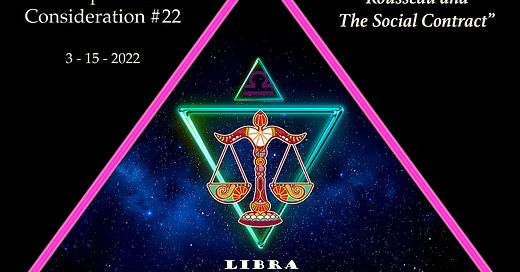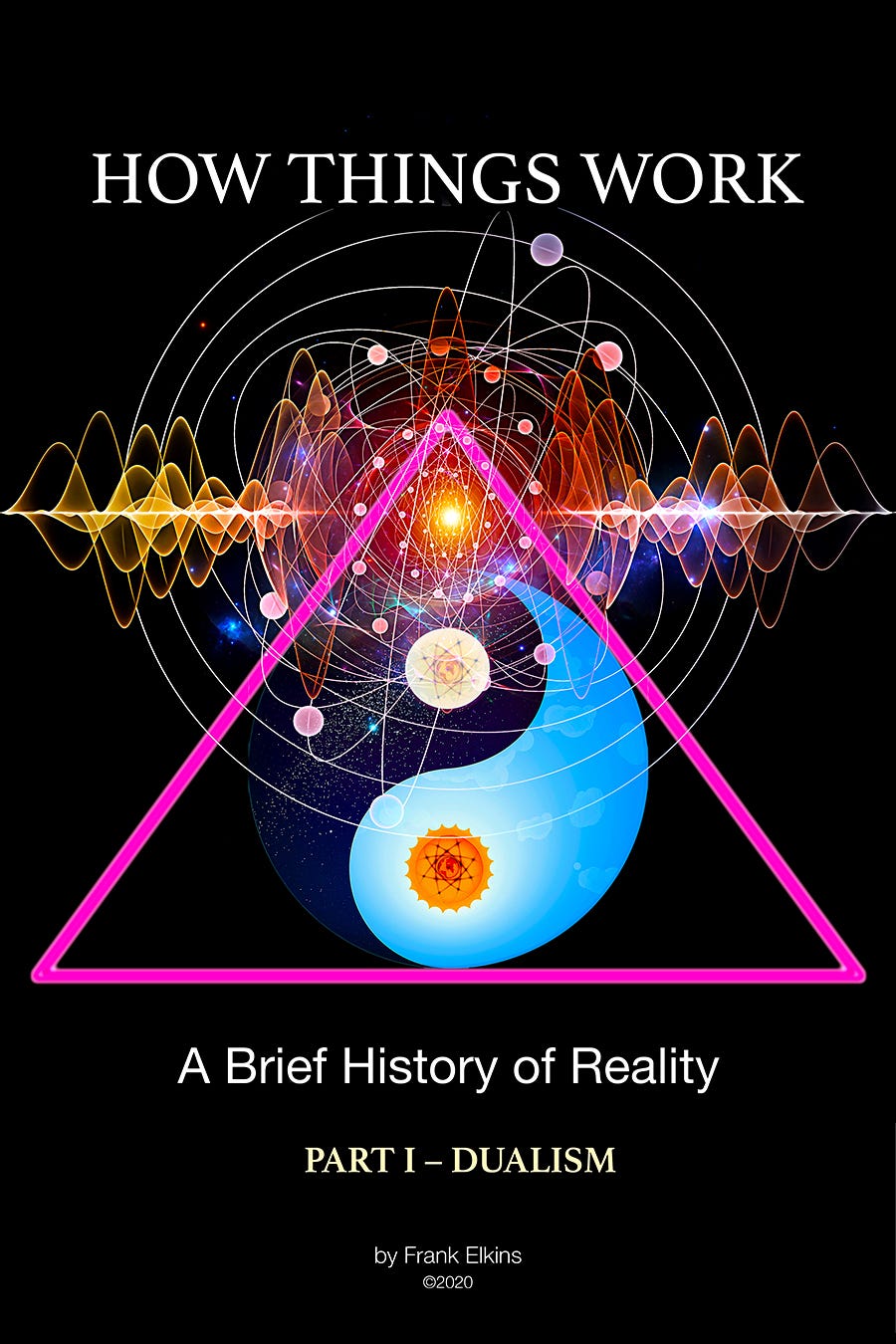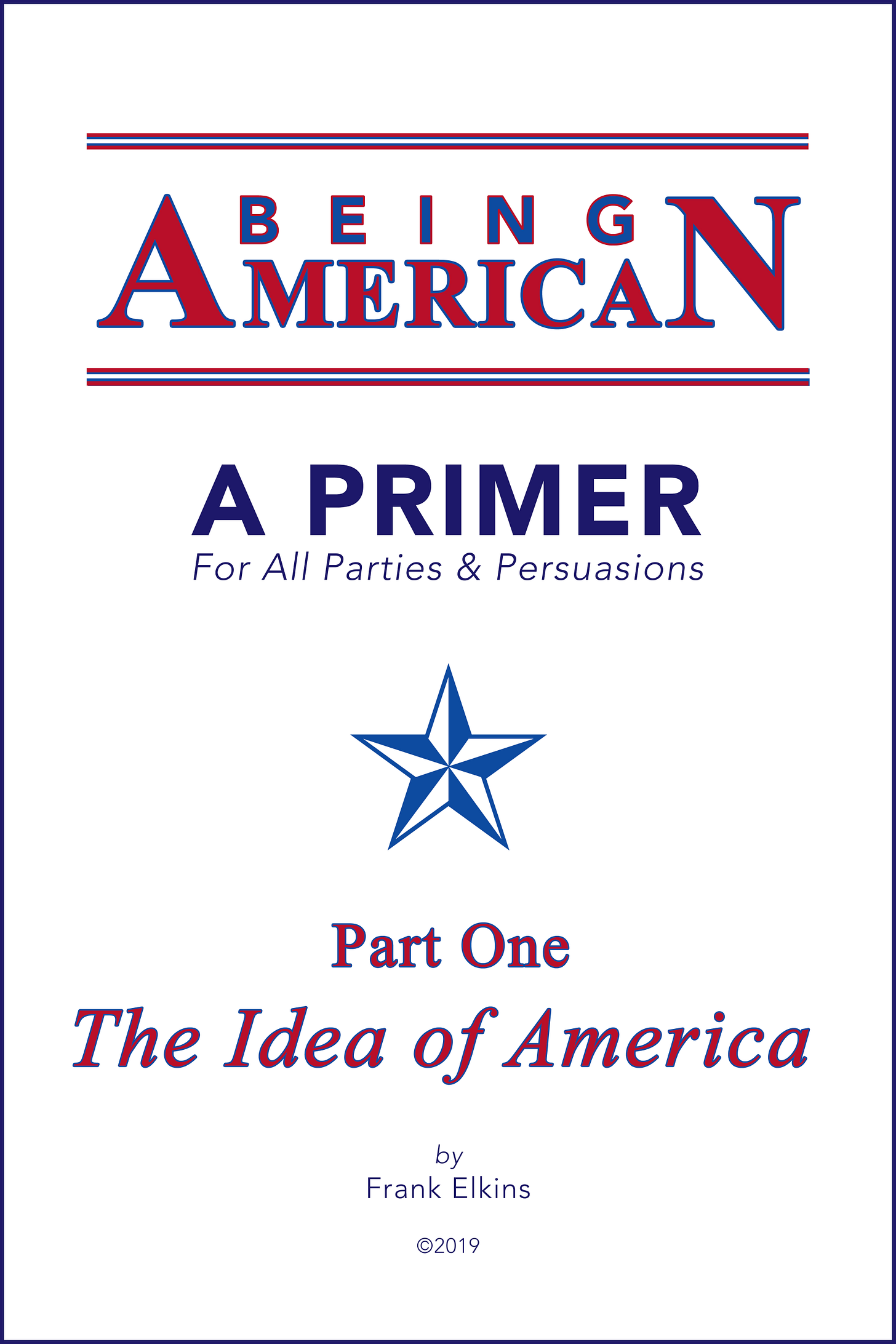How Things Work – A Brief History of Reality
Book I – Dualism (Rousseau & The Social Contract)
Be A Part of the Conversation!
Tuesday, March 15, 2022
“The world of reality has its limits; the world of imagination is boundless.” – Rousseau
CONSIDERATION #22 – “ROUSSEAU” (THE SOCIAL CONTRACT)
PREFACE
“Man was born free, and he is everywhere in chains.”
– Jean-Jacques Rousseau
Welcome Everybody!
The idea of developing and implementing a New Social Contract between government and the governed was of extreme importance to Enlightenment philosophers and thinkers. One of the most influential political philosophers and writers of the time was Jean-Jacques Rousseau.
Jean-Jacques Rousseau was one of the most influential thinkers during the Enlightenment in eighteenth century Europe... The central claim of the work is that human beings are basically good by nature, but were corrupted by the complex historical events that resulted in present day civil society. Rousseau’s praise of nature is a theme that continues throughout his later works as well, the most significant of which include his comprehensive work on the philosophy of education, the Emile, and his major work on political philosophy, The Social Contract: both published in 1762. These works caused great controversy in France and were immediately banned by Paris authorities… Rousseau greatly influenced Immanuel Kant’s work on ethics… and his political ideals were championed by leaders of the French Revolution.
Internet Encyclopedia of Philosophy – Jean-Jacques Rousseau (1712 – 1778)
Although there is debate as to whether Rousseau should be considered the first socialist, he did not embrace the republican capitalist tendencies that many of his contemporaries did. Although, like his contemporaries, Rousseau was against the monarchy and had severe doubts and distrust about democracy; believing it to be essentially “mob rule.” The question for those seeking a New Contract regarding government was “exactly how much autonomy should individuals have, and how much authority should the government have?”
“…autonomy was not given to a monarchy or state, but to the ‘General Will’ represented by the elite of society.”
Although a believer in individual liberty and a rabid abolitionist, Rousseau still argued that individuals should give up some of their autonomy for the overall good of the community. However, autonomy was not given to a monarchy or state, but to the “General Will” represented by the elite of society. Theoretically, in an enlightened society, it made “sense” that the “best” of that society should make the decisions over social moral issues such as wealth. Rousseau sought to create a perfect society based on perfect people consistently using perfect reason. However, this is not a reflection of any known reality, then, or now.
Rousseau was not only a key figure in the Enlightenment, but probably the most popular and widely read intellectual revolutionary in France. Nevertheless, “La Volonté Générale” (the “General Will”), which appears in his influential book Du contrat social ou principes du droit politique, (Social Contract) is nothing more than a utopian dream…
The irony of the theory is that the General Will does not represent the majority of the people, but only of the enlightened few. The Social Contract is entirely premised and patterned on the belief in man’s natural goodness and that he has only been perverted by corrupt social institutions… Once these institutions are eliminated, man will return to his natural state of goodness. This is simply a utopian dream which, in the long run, can only lead to all sorts of oppression by the all-powerful, freely created General Will; the perfect excuse for the establishment of a totalitarian regime under the guise of “democratic” means….
…Rousseau’s misleading conclusions in his Contrat Social and his erroneous revolutionary belief in the attainment of a perfect “democratic” society… His ideas of liberté, égalité, and fraternité, void of any objective moral foundation except the natural goodness of man, quickly turned into the Despotism of Liberty, the Dogmatism of Reason, and the much feared egotism of Adam Smith. These ideas of Rousseau not only influenced the revolutionaries of 1789, but also the development of socialist theory in general. Contrary to Rousseau’s expectations, the end result of his most praised Social Contract was the Reign of Terror and the dictatorship of Bonaparte. Glory was replaced by the infamous guillotine. Rousseau’s Social Contract, together with his General Will, will go down in history as another utopian dream.
– Alberto M Piedra Ph.D., The Legacy of the French Revolution: Rousseau’s General Will and the Reign of Terror – The Institute of World Politics (December 11, 2017)
The American Revolution began with the Declaration of Independence. The French Revolution began with rioters storming the Bastille. The United States embraced freedom of religion. The French Revolution attempted to eradicate Christianity. The United States developed a constitution based on a separation of powers that continues to this day. The first French constitution did not survive its first decade. The United States attempted to establish an imperfect union. The French attempted to implement the perfect society. The French National Convention’s poorly conceived constitution quickly resulted in political factions and frictions that ended the revolution and any chance of liberty, equality, and fraternity.
Following the king’s execution, war with various European powers and intense divisions within the National Convention ushered the French Revolution into its most violent and turbulent phase.
In June 1793, the Jacobins seized control of the National Convention from the more moderate Girondins and instituted a series of radical measures, including the establishment of a new calendar and the eradication of Christianity.
They also unleashed the bloody Reign of Terror (la Terreur), a 10-month period in which suspected enemies of the revolution were guillotined by the thousands. Many of the killings were carried out under orders from Robespierre, who dominated the draconian Committee of Public Safety until his own execution on July 28, 1794… Over 17,000 people were officially tried and executed during the Reign of Terror, and an unknown number of others died in prison or without trial.
History.com – French Revolution
On November 9, 1799, Napoleon Bonaparte appointed himself France’s “first consul,” ending the French Revolution and beginning the Napoleonic Era. Only a decade after storming the Bastille, France was once again under the rule of an authoritarian tyrant.
Why has the American Revolution and the United States Constitution endured for almost 250 years when the French Constitution written only fifteen years later lasted only a decade? The short answer is that the French Revolution insisted on complete and total perfection immediately, achieved through destroying and eliminating everything from the past. The United States implemented a knowingly imperfect government for imperfect citizens and imperfect rulers specifically designed to improve and become “more perfect” over time. France sought to make way for utopia by destroying its own history and heritage; the United States attempted to set up a system specifically designed for making it possible to transcend its past, present, and future limitations and deficiencies.
“The United States Constitution was never perfect and remains imperfect still. However, it still remains.”
The United States and France serve as two possible interpretations of what an effective, efficient, and enduring Social Contract might look like. The United States Constitution was never perfect and remains imperfect still. However, it still remains. It is the oldest functioning constitution in history. This is not an accident.
CONSIDERATION #22: ROUSSEAU & THE SOCIAL CONTRACT
Social Contract Theory
“Every man having been born free and master of himself, no one else may under any pretext whatever subject him without his consent. To assert that the son of a slave is born a slave is to assert that he is not born a man.”
― Jean-Jacques Rousseau
The Social Contract
The Social Contract Theory breaks from the tradition of rule by divine right and argues that governments are instituted in order to serve the needs of the general population or citizenry. This breaks down into two inquiries or investigations: What is the origin of government, and how much authority should a state, or government, have over the individual? It becomes the main focus concerning the nature of government; what is its purpose in the new Age of Reason?
“…before government, people lived in a state of nature in which they were born with ‘natural rights’ such as life, liberty, and property.”
According to Enlightenment philosophers, such as Rousseau, before government, people lived in a state of nature in which they were born with “natural rights” such as life, liberty, and property. (Property being the direct fruits of one’s labor.) These are natural rights because they are not given to you by a government, they are given to you by nature, or the Creator. However, given human nature, the strong would oppress the weak and attempt to take their natural rights from them for their own. In order for the weak to defend themselves from the strong, they united together for protection and made rules in order to live as a group, or society. This is the origin of government.
“The new Age of Reason demanded a more reasonable Social Contract between government and citizens.”
Therefore, governments were formed for the protection and support of the people who formed them, not through divine right or the allegiance to a sovereign. The new Age of Reason demanded a more reasonable Social Contract between government and citizens. However, many began to see each other as completely unreasonable when it came to working out the details of such an enlightened transition. It is one thing to have a vision or dream, it is a completely different thing to implement it into the real world.
POSTSCRIPT
Most Enlightenment thinkers agreed that government, under a new social contract, should be implemented in order to guarantee basic security and reasonable individual autonomy for its citizens. However, the debate over exactly how, and how much, that power and autonomy should be divided between the individual and the government varied widely. In addition, how would such a system work? These were the practical concerns related to the abstract ideas of liberty, equality, and fraternity.
“America was part of the New World with considerably less baggage to weigh them down. America had always been ‘freer’ than Europe.”
One important distinction between the French and American Revolutions is that France was already part of a very long and heavy past in Europe. They had to overcome thousands of years of history and tradition to make way for something new. America was part of the New World with considerably less baggage to weigh them down. America had always been “freer” than Europe. An entire ocean separated them from the past.
“The French Revolution sought to eliminate the past and implement perfection by force, which ironically is a different kind of enslavement.”
The French Revolution attempted to actualize the abstract principles of liberty, equality and fraternity immediately through coercion, compulsion, and oppression, an apparent contradiction to the self-evident truth they espoused. However, this is a weakness that occurs repeatedly throughout history. The French Revolution sought to eliminate the past and implement perfection by force, which ironically is a different kind of enslavement. This never works.
“Their weakness, slavery, would catch up with them in 1861.”
The United States decided to start with where they were, and what they had, in order to build a better future, over time. Their weakness, slavery, would catch up with them in 1861. Abraham Lincoln would defend the Constitution and use it to finally outlaw and abolish the practice with the 13th Amendment on December 6, 1865. However, it would not be the end of America’s legacy and karma related to slavery.
“Much of what allows the nation, through its constitution, to survive and improve has a lot to do with balance.”
The United States is Not Perfect. However, it is more perfect than it was, as well as being less perfect than it will be; hopefully. To seek its immediate and total perfection is to guarantee its destruction. However, to continually seek more perfection is to warranty its future. Much of what allows the nation, through its constitution, to survive and improve has a lot to do with balance.
Next week we will consider the first of two arguments over the balance of power and authority between the citizen and the state. Thomas Hobbes asserts that the weakness of human beings demands no less than a Leviathan to keep it under control.
Learn More About the Idea of America: “Being American: A Primer for All Parties and Persuasions!” Available Exclusively from BooksNotOnAmazon.com
All Three “How Things Work” Books Including “Book-3 The Enigmatic Mystery” are Now Available in One Volume: “How Things Work – Volume I Science & Religion” for Only $9.95! Exclusively through BooksNotOnAmazon.com






